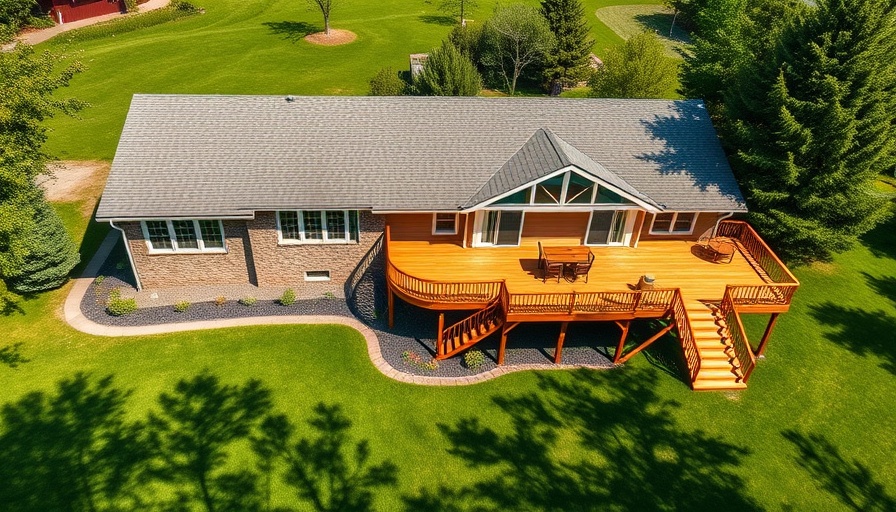
Understanding the Intricacies of Brooklyn's Basement Zoning Laws
As Brooklyn continues to evolve, so too do its zoning laws, particularly regarding basements. Homeowners looking to make the most out of their basement space must navigate through a labyrinth of regulations that differ not only between neighborhoods but also based on the specific usage of the space.
Primarily, basement zoning laws in Brooklyn are in place to protect residential integrity and ensure safety. These regulations set requirements, such as minimum ceiling heights, requisite ventilation, and egress plans that accommodate safe exits in emergencies. Understanding these guidelines can shield homeowners from future legal headaches, financial penalties, and more severe actions like the demolition of unpermitted work.
Common Misconceptions: Busting the Myths Around Basement Usage
A widespread misconception among homeowners is that any basement renovation automatically translates to legal occupancy. Lets clarify: transforming a basement into a living space or a rental unit typically requires securing specific permits, which adhere to the local zoning ordinances. Not knowing what constitutes a legal living space can lead to substantial fines or, in unfortunate cases, removal of the illegal structure.
Additionally, many people believe that simply finishing their basement guarantees it as an alternative rental unit or livable space. In reality, each borough has flanked rules that define what can be considered a legitimate living area and what cannot. Therefore, taking the time to understand zoning regulations before diving into renovations is critical.
The Importance of Compliance with Neighborhood Regulations
Failing to comply with local zoning laws can have catastrophic impacts on property values and usability. For instance, let's say a homeowner in Caroll Gardens sets out to create a luxurious Airbnb in his basement. If he bypasses legal steps and renovations aren’t up to code, he risks not only the immediate enjoyment of that investment but also fines and a potentially lengthy legal battle. This could negate all potential income and even lead to legal actions by neighbors or city officials.
Neighborhood-Specific Regulations: What You Need to Know
Unlike finding one-size-fits-all solutions, Brooklyn's neighborhoods form a mosaic of zoning laws tailored to their unique characteristics and community priorities. Understanding that a certain district might allow living spaces in basements like in Greenpoint, while others may have stringent restrictions like in Park Slope, is vital when planning any renovations. Each area may also have requirements for things like natural light access and utilities setups that must be adhered to.
Practical Planning Tips for Homeowners
To maximize the chances of achieving a successful renovation while adhering to local laws, homeowners should undertake several preparatory steps:
- Research Local Zoning Laws: Before making any decisions, check the local government’s website or consult with a zoning law expert about the specifics pertaining to your area.
- Secure Necessary Permits: Depending on the extent of your renovation, obtaining the necessary permits is non-negotiable if you wish to avoid hefty fines or removal of your work in progress.
- Engage Qualified Professionals: Whether an architect or builder, professionals familiar with local laws can significantly help navigate compliance requirements, ensuring that your plans meet all local standards.
Reflecting on Future Trends in Basement Renovation
As urban living continues to rise in popularity, particularly in vibrant cities like Brooklyn, the potential demand for legal rental spaces in renovated basements grows. Homeowners looking to capitalize on this trend should focus on understanding market demands, such as eco-friendly modifications or soundproofing designs that cater to desirability.
Compliance isn’t just about avoiding legal difficulties; it's also about understanding what modern renters are looking for. From incorporating smart home technology to ensuring soundproofing for maximum peace, aligning your renovation with future trends can offer significant advantages.
Final Thoughts on Zoning Laws: Protect Your Investment
Empowering yourself with knowledge about Brooklyn's basement zoning regulations not only prepares you for renovations but also secures your investment for future property value. Understanding what is required to legally occupy and utilize your basement ensures that you maximize functionality without courting disaster. Always consult with an expert when in doubt.
For all Brooklyn homeowners, staying informed on zoning laws is pivotal to both optimizing your property and safeguarding against costly legal and financial repercussions. Knowledge is power, especially in real estate.
 Add Row
Add Row  Add
Add 




 Add Row
Add Row  Add
Add 

Write A Comment